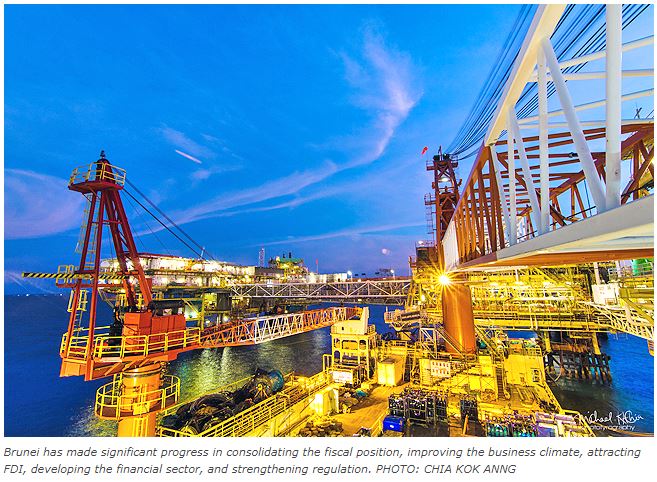Brunei GDP to grow 1.8pc, says IMF report
Brunei economic growth is expected to pick up in 2019 to 1.8 per cent, with the outlook improving further over the medium term, driven by stronger oil and gas (O&G) activities from asset rejuvenation and large foreign direct investment (FDI) projects.
This was highlighted by International Monetary Fund (IMF) in its 2019 article IV consultation and staff report released last Thursday.
IMF said the ramp-up of capital spending under the 11th National Development Plan (RKN11) would also support the non-O&G growth. The start of operations of large downstream investment projects – the Hengyi refinery and Brunei Fertiliser Industries – and stronger O&G activities will further improve the outlook from 2020 onward.
Inflation would remain low. The current account surplus would increase over the medium term, reflecting stronger exports of O&G and downstream products.
The fiscal position would deteriorate owing to lower O&G prices this year, while it is expected to recover over the medium term. Risks to the near-term outlook are tilted to the downside.
Lower-than-expected O&G prices or production would reduce fiscal revenues and exports, with significant spillovers to the non-O&G sector.
The IMF report further said Brunei Darussalam’s economy has been adjusting to the lower O&G prices since 2014, with the authorities undertaking wide-ranging reforms. Brunei has made significant progress in consolidating the fiscal position, improving the business climate, attracting FDI, developing the financial sector, and strengthening regulation.
IMF said nevertheless, Brunei faces challenges and risks. Future oil production and prices remain uncertain.
Against this backdrop, the reforms should continue to ensure long term sustainability and intergenerational equity, increase productivity and competitiveness, diversify the sources of growth, reduce unemployment – especially youth unemployment, and build resilience to shocks. Staff supports the authorities’ fiscal consolidation programme, although more ambition is called for to bring the fiscal position gradually closer to that implied by intergenerational equity considerations.
Over the medium term, IMF staff recommended continuous reforms in public services and the wage bill, including streamlining civil service vacancies; reform fuel subsidies; rebalance further budget spending toward growth-enhancing activities, and increase non O&G revenues.
Adopting a formal medium-term fiscal framework would help control spending and delink it from O&G revenue fluctuations.
Digitalisation can help improve public financial management. The peg to the Singapore dollar remains appropriate, providing a credible nominal anchor and stability to the financial system.
The external position is assessed to be weaker in 2018 than fundamentals.
However, the current account balance, on current policies, is expected to rebound, closing the gap over the medium term as new downstream exports rise. IMF commended the nation’s economic diversification.
It said Brunei has made strides in improving business environment, while attracting sizable FDI in the priority business clusters, mainly in the downstream O&G sector.
Going forward, continued efforts are needed to further improve the business environment, attract quality FDI, enhance human capital, and reform labour market to foster private sector led-growth and reduce unemployment.
IMF staff supports the authorities’ initiatives to develop the financial sector, while safeguarding financial stability and integrity. The initiatives include steps to broaden the investor base, establish a secondary bond market, develop the required infrastructure and rules for establishing a stock exchange, and put all the three pillars of Basel II in place. Given the size of banking assets placed offshore, the Autoriti Monetari Brunei Darussalam should closely monitor the potential risks emanating from external shocks.
Source: https://borneobulletin.com.bn/brunei-gdp-grow-1-8pc-says-imf-report/


 Thailand
Thailand




